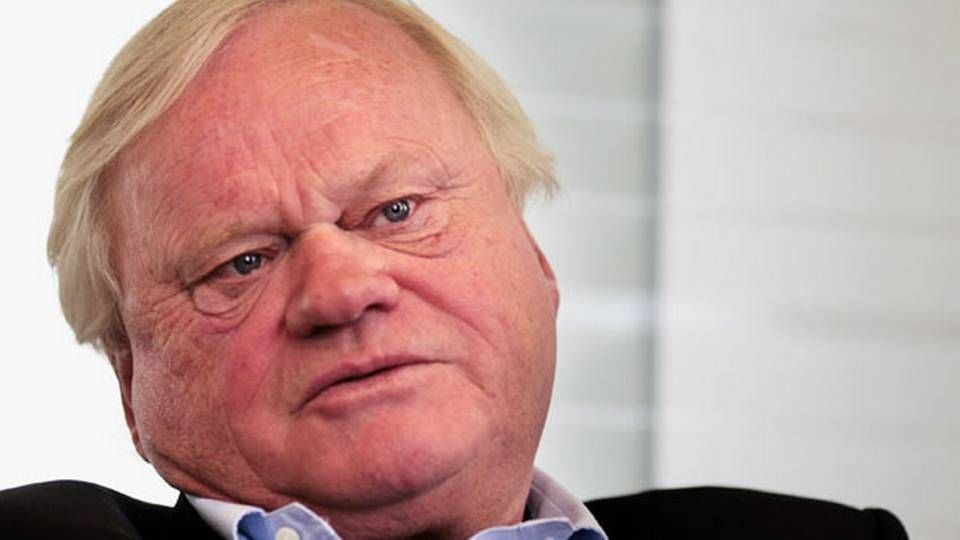Fredriksen continues his crusade to become top supertanker player

John Fredriksen's repeated and persistent attempts at gaining control of DHT Holdings are spurred by the fact that such a move would make Frontline the by far biggest player in the VLCC segment – a role that Frontline is hoping to achieve already in 2017.
This position as market leader is so attractive to Frontline right now that it makes sense for the carrier to launch a new attempt by filing a new lawsuit against DHT Holdings in the Marshall Islands despite last week's defeat in New York, several analysts tell ShippingWatch.
The new lawsuit, filed Thursday, aims to prevent BW Group from gaining more influence in DHT than the carrier has already achieved through the deal signed between BW Group and DHT, a deal which added 11 VLCC supertankers to DHT's fleet in return for a major stake to BW Group in DHT.
"If Frontline is able to take over or collaborate more with DHT, it would definitely push them to the forefront as market leader. It would give Frontline a much larger fleet, younger vessels, and a much greater capitalization of the market, which will help them get financing. Size does matter," Lukas Daul, analyst at ABG Sundal Collier, tells ShippingWatch.
"There's a big difference between increasing one's fleet by one or two vessels, but being able to grow the fleet by 30 VLCCs in one swoop would be a superior move, and that's what they're going for," he says.
A killer to buy newbuilds
Frontline tapped the markets for capital for growth in the winter of 2016, and the carrier has previously announced that it considers 2017 an ideal time to buy new tonnage.
"There's not much modern high-quality tonnage for sale in the second-hand market these days, and the gap between buyers and sellers is too big for activity in this market, so the alternative is either growth through newbuildings, mergers, or acquisitions of existing fleets," says Andreas Wikborg, analyst at Arctic Securities.
"From an industrial standpoint it would be a killer if everyone bought newbuilds, and Frontline is aware of this, but the carrier has also stated that it will pursue all beneficial transactions. We saw them buy two resales earlier this year at a good price, but this is also a result of Fredriksen's network," says Wikborg.
Before the deal between DHT and BW Group was sealed, estimates were that Frontline with a takeover of DHT would get a fleet corresponding to 10 percent of the world's VLCCs. With the new ships from BW Group added to this, Frontline's market share would be even greater.

DHT Holdings' two CEOs, Trygve P. Munthe (left) and Svein Moxnes Harfjeld
Insufficient offer
Whether Frontline's tenacity will pay off is far from certain, according to analysts as well as the object of Frontline's affection, DHT Holdings.
"It's a bit strange that Frontline in its latest bid on Tuesday this week presents the exact same offer as back in February. The board reviewed the offer at the time and decided that it did not represent a fair deal, but instead a far too one-sided proposal for a deal. We see this as a highly insufficient offer," Trygve P. Munthe, one of DHT's two CEOs, tells ShippingWatch.
"We've made it perfectly clear that we want a balanced share composition," says Munthe.
Clarksons Platou noted in an analysis Wednesday that DHT will likely once again reject the offer. ABG Sundal Collier, however, declines to venture a specific prediction about the outcome of Fredriksen's courtship.
"One should of course never say never, but the offer has already been rejected once, and it would be strange if DHT says yes. But things may have changed after the deal with BW Group. It should ultimately be the shareholders in DHT who decide what happens going forward," says Daul.
And the shareholders are not all pleased with DHT's handling of the repeated offers from Fredriksen's Frontline. Norwegian business daily Dagens Næringsliv reports that investor and portfolio manager Jan Petter Sissener is highly displeased.
"There's no doubt that the sympathy lies with Frontline. DHT's corporate governance belongs in the 1980s. It's not the management and the board who decide whether an offer is attractive, it's the shareholders," he tells the newspaper.
Could create lucrative tanker share
Andreas Wikborg from Arctic Securities stresses that Fredriksen and Frontline, by taking over DHT, could create a very attractive tanker share for investors.
"The share would of course be volatile due to the cyclical nature of the tanker market and in light of the company's significant exposure to larger tanker vessels. But it would also have a very attractive cost structure with cheap financing, low fleet break-even, and the acquisition would bring costs further down through economies of scale. As a shipping company the share would be volatile, but the company would have a higher liquidity, so I think it would attract additional interest from international investors," he says.
ShippingWatch has spoken to Frontline CEO Robert Hvide Macleod, who declines to comment on the matter.
English Edit: Daniel Logan Berg-Munch
Fredriksen makes new attempt to buy DHT
DHT and BW Group defy Fredriksen's block attempt
Related articles
Fredriksen makes new attempt to buy DHT
For subscribers
DHT and BW Group defy Fredriksen's block attempt
For subscribers
Frontline unsuccessfully courted DHT for more than a year
For subscribers


















